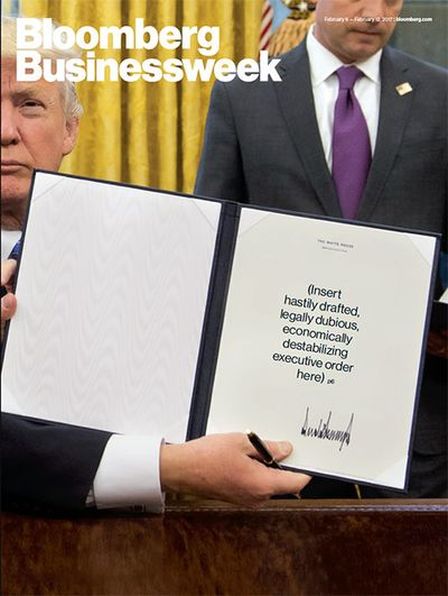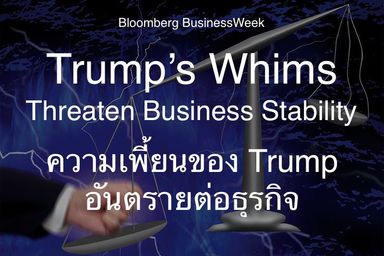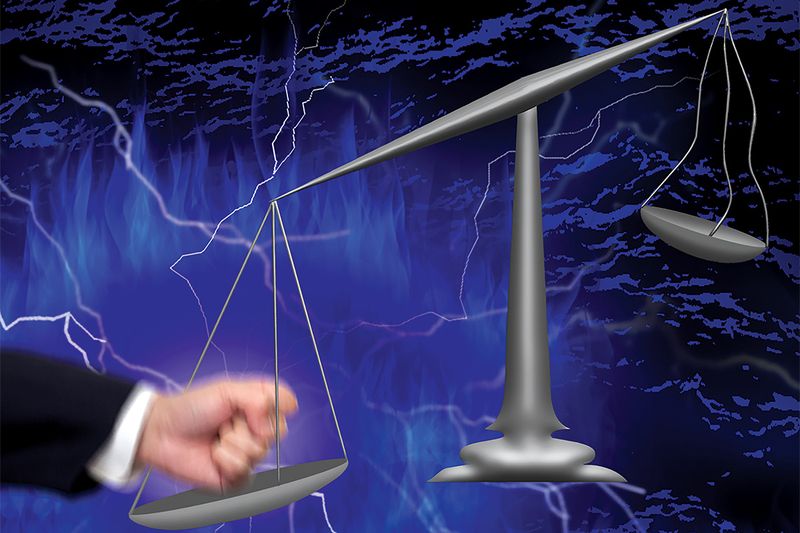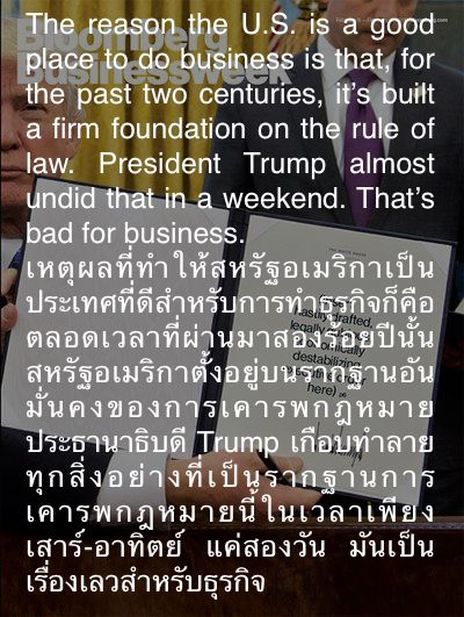|
Photographer: Saul Loeb/AFP/Getty Images; Illustration: 731
|
"Many people in the business and financial and technology communities listened to what Trump said and cheerily assumed he’d do something completely different."
"คนในวงการธุรกิจ การเงิน และเทคโนโลยีหลายคนฟังที่ Trump พูด แล้วคิดสบายใจว่าเขาจะทำตรงกันข้ามกับทุกอย่างที่เขาพูดอย่างแน่" "If the president can, without consulting the courts or Congress, banish U.S. lawful permanent residents, then he can do anything. If there’s no rule of law for some people, there’s no rule of law for anyone." "ถ้าประธานาธิบดีสามารถทำอะไรๆได้โดยไม่ปรึกษาศาล ไม่ปรึกษารัฐสภา สั่งห้ามคนต่างด้าวที่มีสิทธิพำนักในประเทศไม่ให้กลับเข้าเมืองมาพำนักอยู่ได้อีก ถ้าอย่างนั้นประธานาธิบดีก็ทำอะไรๆได้ทุกอย่าง หากประธานาธิบดีไม่เคารพกฎหมายในการปฏิบัติต่อพลเมืองบางคนเลย แล้วก็ท่านก็คงจะไม่เคารพกฎหมายในการปฏิบัติต่อพลเมืองคนไหนๆก็ได้เช่นกัน" |

Featured in Bloomberg Businessweek, Feb. 6-12, 2017. Subscribe now. Photographer: Saul Loeb/AFP/Getty Images; Illustration: 731 Stability Is Good for Business. Trump’s Whims Threaten It One weekend came close to undoing the firm legal foundation on which U.S. business has thrived. ความเพี้ยนของ Trump เป็นอันตราย ข่มขู่ความมั่นคงของธุรกิจ มีช่วงสุดสัปดาห์หนึ่งที่เกือบขุดรากถอนโคนหลักการเคารพกฎหมาย อันเป็นรากฐานของการทำธุรกิจให้รุ่งเรืองไปเลย by Matt Levine February 2, 2017, 5:00 PM GMT+7 From Subscribe Reprints In October 2016, Anthony Scaramucci compared the U.S. Department of Labor’s fiduciary rule to Dred Scott v. Sandford, the 1857 U.S. Supreme Court decision protecting slavery and ruling that blacks couldn’t be citizens. “The left-leaning Department of Labor has made a decision to discriminate against a class of people who they deem to be adding no value,” said Scaramucci, a fund-of-funds marketer who was also an adviser and public supporter of Donald Trump’s campaign. And he said that, if elected, Trump would repeal the fiduciary rule. Trump, however, never said that during his campaign. Instead, he promised to ban Muslims from entering the U.S. Scaramucci tried not to think about this: “I’ll make a prediction right now that he will not put a ban on Muslims coming into America,” he once told Gawker. Did he believe that? Or did he just think that the Department of Labor rule requiring financial advisers to put their customers’ interests ahead of their own is the great moral evil of our time, comparable to slavery, and that if Trump could repeal that rule then he was worth supporting, regardless of what he did about immigration? Now Trump has his Muslim ban, sort of. On Jan. 27—International Holocaust Remembrance Day—he issued an executive order banning people from seven Muslim-majority countries from traveling to the U.S. The ban covered interpreters who heroically helped the U.S. military, children of U.S. citizens, dissidents who stood up to hostile regimes, medical researchers, Syrian Christians, British Olympians, and endangered refugee families who were carefully vetted to be allowed into the U.S. But you know what Trump hasn’t done yet? Repeal the fiduciary rule! Or even talk about it. Its future remains uncertain, and while there’s a good chance that it will eventually be repealed, big brokerages are moving to comply with its requirements anyway, ahead of its scheduled implementation in April. This is a widespread pattern. Many people in the business and financial and technology communities listened to what Trump said and cheerily assumed he’d do something completely different. Sure, he talked about restricting trade and banning Muslim immigrants, but what they heard was that he’d enact “sensible immigration policy” and pro-growth trade agreements, reduce taxes, cut back regulation, and generally improve conditions for business. In the runup to the presidential election, billionaire Peter Thiel and other Trump supporters said the candidate should be taken “seriously but not literally.” As I wrote in my Bloomberg View column, taking Trump literally means believing that he’ll do what he says; taking him seriously means believing that he’ll do what you want. คนในวงการธุรกิจ การเงิน และเทคโนโลยีหลายคนฟังที่ Trump พูด แล้วคิดสบายใจว่าเขาจะทำตรงกันข้ามกับทุกอย่างที่เขาพูดอย่างแน่ ในช่วงใกล้การเลือกตั้ง มหาเศรษฐี Peter Thiel และผู้สนับสนุน Trump คนอื่นๆ พูดว่า เราควรจะเชื่อในตัว Trump อย่างจริงจัง แต่ต้องไม่เชื่อทุกคำที่เขาพูด" ซึ่งผมก็เขียนในคอลัมน์ Bloomberg View ของผมแล้วว่า การเชื่อทุกคำพูดของ Trump หมายความว่าเชื่อว่าเขาจะทำตามที่พูด; ส่วนที่ว่าให้เชื่อในตัว Trump อย่างจริงจังนั้นเป็นการเชื่อว่าเขาจะทำอย่างที่คุณต้องการ What’s happened so far? Immigration bans, border walls, abandoned trade agreements, an official reliance on “alternative facts,” unprompted promises to bring back torture. And what hasn’t happened so far? Tax policy is a complete mystery, with an unclear and walked-back proposal to impose a border tax. Health-care policy is even more mysterious. Trump has promised to do a “big number on Dodd-Frank” and has issued an executive order requiring agencies to retire two regulations for each new regulation they implement, but that order doesn’t seem to apply to Trump’s own remarkable flurry of rules that complicate the regulation of immigration and business relocation. ⤴︎
|
Everything Trump literally said is coming literally true; everything the serious people heard remains an unserious hope. Businesses may eventually get the tax and regulatory reform they wanted, but it’s not a priority. The technology industry, the financial industry, and some others are beginning to figure this out. Richard Fenning, the chief executive officer of consulting firm Control Risks, told Bloomberg TV that the president has “had this extraordinary honeymoon where Wall Street has kind of discounted all the negative aspects.” However, as the ramifications of the migrant ban set in, “perhaps that honeymoon is starting to be over.”
The problem is bigger than some disagreements over policy priorities. The most troubling aspect of Trump’s immigration order may be that it covered U.S. lawful permanent residents, that is, green card holders who’d spent years building lives in the U.S. While the timeline is a little unclear, it appears that the Department of Homeland Security originally assumed that the order wouldn’t apply to green card holders but was overruled by political advisers in the White House. After a weekend of protest, this decision was reversed, and Secretary of Homeland Security John Kelly announced that green card holders would be allowed in—unless he finds a reason to keep them out. All of this happened through informal channels, avoiding the usual rule-making and oversight procedures that normally constrain our administrative state, and left even those in charge of enforcing the order confused. “A Border Patrol agent, confronted with arriving refugees, referred questions only to the president himself,” reported CNN. A visitor from Jordan—a country not on the banned list—was reportedly denied entry in Chicago. And after several federal courts issued orders staying enforcement, there were reports that Customs and Border Protection agents were defying those court orders. --------------------------------------------------------------------------------------------------------------- Many listened to Trump and cheerily assumed he’d do something completely different ------------------------------------------------------------------------------------------------------------------------ Featured in Bloomberg Businessweek, Feb. 6-12, 2017. Subscribe now.
Photographer: Saul Loeb/AFP/Getty Images; Illustration: 731 The upshot is that U.S. lawful permanent residents, who have spent years jumping through hoops to comply with the intricate immigration rules enshrined in U.S. law, are no longer protected by that law. They can be deported at the whim of the president, or his advisers, or a border agent—or they can be spared by a two-sentence statement from the secretary of Homeland Security. There are no guarantees that the courts or legal procedure can protect them. The nation of laws they immigrated to is gone, replaced by a nation of arbitrary rule.
If the president can, without consulting the courts or Congress, banish U.S. lawful permanent residents, then he can do anything. If there’s no rule of law for some people, there’s no rule of law for anyone. ถ้าประธานาธิบดีสามารถทำอะไรๆได้โดยไม่ปรึกษาศาล ไม่ปรึกษารัฐสภา สั่งห้ามคนต่างด้าวที่มีสิทธิพำนักในประเทศไม่ให้กลับเข้าเมืองมาพำนักอยู่ได้อีก ถ้าอย่างนั้นประธานาธิบดีก็ทำอะไรๆได้ทุกอย่าง หากประธานาธิบดีไม่เคารพกฎหมายในการปฏิบัติต่อพลเมืองบางคนเลย แล้วก็ท่านก็คงจะไม่เคารพกฎหมายในการปฏิบัติต่อพลเมืองคนไหนๆก็ได้เช่นกัน Business leaders are waking up to that reality. Many grouse in private about the impact of Trump’s actions but are afraid to speak out publicly. “They are scared out of their minds about being attacked,” wrote Andrew Ross Sorkin of the New York Times, “and what that’s going to do for their business.” หลายคนบ่นเงียบๆเรื่องผลกระทบจากการกระทำของ Trump แต่ไม่กล้าโวยวายในที่สาธารณะ Andrew Ross Sorkin แห่ง New York Yimes เขียนว่า "พวกเขากลัวหัวหดเมื่อถูกโจมตี และกลัวว่าอะไรจะเกิดกับธุรกิจของพวกเขาก็ไม่มีทางรู้ When the president can damage your business with a tweet—and will, if you disagree with him publicly—then dissent is more difficult. Business decisions, too, are now complicated by the fact that a company that decides to close a factory must now answer personally to the president. As my colleague Peter Coy wrote in these pages in the last issue, businesses spent eight years under President Barack Obama complaining about “uncertainty” in the tax code, in the Affordable Care Act, and in regulation. President Trump’s first week, of drastic and inconsistent ad hoc regulation, seems unlikely to inspire any certainty. เมื่อประธานาธิบดีสามารถทำลายธุรกิจของท่านด้วยการเพียงส่งข้อความสั้นทาง Twitter - และแน่นอนว่าเขาจะทำ ถ้าคุณทำตัวไม่เชื่อฟังท่านในเวทีสาธารณะ - ถ้าอย่างนั้นการแตกแถวออกมาค้านประธานาธิบดีก็ทำยากขึ้น การตัดสินใจทางธุรกิจตอนนี้ก็ยุ่งยากซับซ้อนเพราะว่าหากบริษัทใดตัดสินใจจะปิดโรงงานเวลานี้ต้องไปคุยกับประธานาธิดีตัวต่อตัว .....สัปดาห์แรกของประธานาธิบดี Trump มอง ไม่เห็นแววของความแน่นอน The reason the U.S. is a good place to do business is that, for the past two centuries, it’s built a firm foundation on the rule of law. President Trump almost undid that in a weekend. That’s bad for business. เหตุผลที่ทำให้สหรัฐอเมริกาเป็นประเทศที่ดีสำหรับการทำธุรกิจก็คือ ตลอดเวลาที่ผ่านมาสองร้อยปีนั้น สหรัฐอเมริกาตั้งอยู่บนรากฐานอันมั่นคงของการเคารพกฎหมาย ประธานาธิบดี Trump เกือบทำลายทุกสิ่งอย่างที่เป็นรากฐานการเคารพกฎหมายนี้ในเวลาเพียงเสาร์-อาทิตย์ แค่สองวัน มันเป็นเรื่องเลวสำหรับธุรกิจ _______________________________________________________________________________ Reference: https://www.bloomberg.com/news/articles/2017-02-02/stability-is-good-for-business-trump-s-whims-threaten-it?cmpid=BBD020217_BIZ |



